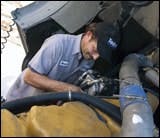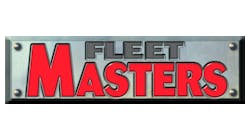The primary goals and objectives of the City of Jacksonville's Fleet Management Division are to improve the availability of equipment, get maximum use from city resources, and provide fuel to city and state agencies and utility customers.
Because the fleet-management division is supporting the Jacksonville Sheriff's Office, Fire & Rescue, and Public Works Departments, plus general government, independent authorities, and the Florida Department of Transportation, equipment and fuel availability are critical, especially during hurricane season and other emergency situations. Equipment is essential to these agencies' missions.
City of Jacksonville Fleet Management Division
Specialty: Municipal fleet management
Fleet Value: $172 million
Fleet Makeup: 5,400 units including 154 pieces of fire and rescue apparatus, 100 off-road construction machines (including 22 backhoe-loaders, 31 excavators, 33 loaders); 410 Class 7 and 8 trucks, and 2,250 light trucks and cars
Vehicle Replacement Budget: About $18 million per year
Facilities: One shop; eight mechanics trucks and three wreckers; three lube service trucks, three fuel service trucks and one fuel transport; eight 24-hour fuel sites, one bio-diesel mixing and dispensing facility, and one E85 fuel site
Equipment-Support Staff: 163 total including 81 mechanics, nine welders/fabricators, 22 supervisors/lead workers, 15 parts workers, five maintenance technicians, and 25 support people
Operating Budget: $31.6 million (in 2005), including $12 million for fueling operations
Customers: Jacksonville police, fire, refuse-collection, and other city agencies; Jacksonville Electric Authority, Florida Dept. of Transportation, and State Attorneys Office
Services: Equipment specification writing, purchasing, and salvage; aerial device repair/rebuilding, hydraulic repair/rebuilding, welding/fabrication, car and light truck repair and maintenance, minor body repair, accessory installation, heavy truck and off-road equipment repair and maintenance, fire and rescue equipment repair and maintenance, tire service, off-site PM service
Geographic Range: Duval County — 840 square miles with 800,000 population
Sam Houston, chief of the city fleet management division, has focused on delivering preventive maintenance and safety inspections to maintain availability, and on scheduling and production incentives to maximize shops productivity and make the most of city resources.
Automated scheduling software produces reports for vehicles that are due for maintenance two months in advance so shop managers can be sure to have labor, parts and materials on hand when equipment arrives for service. An accompanying system monitors the progress of every work order from open to close. The status of each work order is updated every 15 minutes, and the system allows managers to check the reason why the work required more time than was originally estimated. A Quality Assurance effort has reduced returns to the shop to 1 percent.
Preventive maintenance on light vehicles is administered with the same scheduling system, but the actual oil and filter changes are done by a low-cost vendor with locations all around Duval County. In 2005, 20,000 PMs were scheduled, and 95 percent of them were completed on time. The fleet-management division continues to conduct maintenance on medium and heavy-duty vehicles and off-road equipment.
Getting preventive maintenance done on time and with expertise has had the desired effect. When combined with an initiative to conduct all of the off-site fueling and tire service at night, when equipment is idle, equipment availability increased from around 90 percent before 2003 to 99 percent in 2005. The number of overdue PM and safety inspections was reduced from 56 in 2004 to 33 in 2005.
Seeing the number of repairs that were going next door to the fire-apparatus dealer's shop and other area vendors, Jacksonville's own technicians called the city to complete more warranty repairs. They saw the unused capacity in the shop and, frankly, were also hoping to earn some overtime hours. Houston agreed that there was more productivity to be gained from the existing workforce and facility, so he set about getting the fleet-management division certified for warranty work on Ford, General Motors, and International vehicles as well as American LaFrance and Pierce fire apparatus.
Houston turned his attention to technician productivity in order to make sure repairs and maintenance are done at competitive costs. Each year, managers, supervisors, and technicians meet to agree upon production goals. Performance is measured monthly, and technicians or supervisors that lag their goals are provided with training to help them hit their targets.
All employees who meet their production goal are paid an incentive equal to 1 percent of their base salary. Last fiscal year, only two employees didn't reach their target.
As an added incentive, the organization also pays technicians $25/month for each ASE and Emergency Vehicle Technician certification they maintain, up to nine certifications per person. Jacksonville technicians currently hold a total of 356 individual certifications. Jacksonville Fleet Management Division also pays technicians a monthly tool allowance of $450.
Productivity has increased tremendously. So much that Houston has chosen not to fill 21 staff positions that opened due to attrition. Replacing those people hasn't proven to be necessary. Actual payroll cost has stayed about the same — actually increased about two percent (or $123,800) between 2002 and 2005, as overtime and use of temporary labor has increased. But over the same period, the cost of outsourced repairs has dropped nearly 50 percent, or $1.5 million.
Efficiency gains ultimately led the division to hire itself out as a service vendor to the Florida DOT, integrating about 275 pieces of Florida DOT equipment into the Jacksonville fleet. That, coupled with fueling services for local utilities generates about $450,000 in annual revenue to offset the cost of replacing City of Jacksonville equipment.






